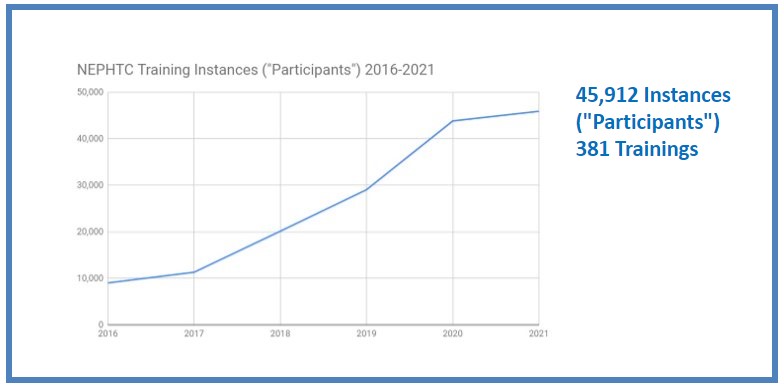A Tough But Good Year for NEPHTC Training Enrollment
 NEPHTC reported this Fiscal Year’s 2021 performance to our funder, the Health Resource and Services Administration on July 30, 2021. In the past year, from July 1, 2020 to June 30, 2021, NEPTHC and our fabulous Community Based Training Partners reported 45,912 instances of training (commonly called “participants”), an increase of approximately 2,000 from the previous year.
NEPHTC reported this Fiscal Year’s 2021 performance to our funder, the Health Resource and Services Administration on July 30, 2021. In the past year, from July 1, 2020 to June 30, 2021, NEPTHC and our fabulous Community Based Training Partners reported 45,912 instances of training (commonly called “participants”), an increase of approximately 2,000 from the previous year.
The strains of COVID faced our enrollees as well. We saw downward pressure on enrollments coming from zoom fatigue, burnout and uncertainty about reengagement after all of the sprinting from the past year. However, encouraging enrollment was increases in titles, continuations of hot COVID topics, our large investment in getting more credentialing, particularly more CHES credits, another great promotion from the CDC Learning Connection, and continued solid email marketing.
This year, our number of titles of “webinar and video” increased, as we captured more sessions of Community Conversations from our university, the Boston University School of Public Health, and from our partners conferences where regional topics were highly actionable and valuable for the local workforce. Nonetheless, because we did not sponsor a national conference in FY21, our total number of titles was down from 501 to 381. We also reduced titles due to a large transition taking place in our sister training center and Community Based Training partner serving school nurses, which made gathering the courses information laborious – in the end we had to present summary information for some large detailed trainings rather than enter the detailed course level content.
 We are grateful to all of our partners, but in particular want to compliment our Connecticut partner, the Yale School of Public Health Office of Practice, which manages our CHES credits and offers them to our partners. This is a huge help. In addition, some of their online courses had very large numbers of enrollees, which demonstrates the excellent collaboration between Yale and the Connecticut Department of Health at identifying priority training needs and getting the trainings produced.
We are grateful to all of our partners, but in particular want to compliment our Connecticut partner, the Yale School of Public Health Office of Practice, which manages our CHES credits and offers them to our partners. This is a huge help. In addition, some of their online courses had very large numbers of enrollees, which demonstrates the excellent collaboration between Yale and the Connecticut Department of Health at identifying priority training needs and getting the trainings produced.